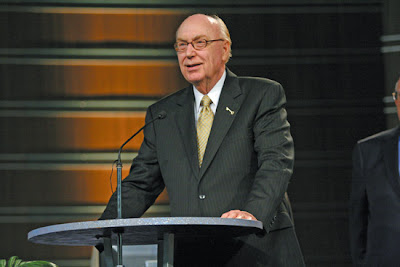
George O. Wood, who now heads one of the nation’s largest Pentecostal groups (1.6 million members in the US and 57 million adherents worldwide), is a by-product of church planting.
Generations of Wood's family are believers largely because a 24-year-old minister felt a burden to a plant a church in Jeanette, Pa., nearly 100 years ago.
Back then, however, there weren't any resources or financial backing from churches or denominations like there are today for ministers freshly starting church plants. But when a young minister, Ben Mahan, still took the risk and began holding worship meetings on the streets of Jeanette and later established a church, Wood's grandmother and father accepted Christ.
"This is what church planting does," said Wood in a chapel service at the Assemblies of God national headquarters in Springfield, Mo. "Not only was my dad saved but his family now. All of us children [are] serving the Lord and most all of our grandchildren and great grandchildren."
Moreover, there's a strong church today in northwest China with 15,000 believers – a church that Wood's parents helped establish.
"It all happened because somebody had a burden to go plant a church," said Wood.
"All across America there are people that are like my dad that if we can reach them, we'll not only reach them but everyone coming after them."
Wood was elected in August 2007 as general superintendent, succeeding Thomas E. Trask. Now as head of 12,311 Assemblies of God churches, he preaches a critical core value to the Pentecostals – "vigorously plant new churches."
"We know that planting new churches probably in our culture is the single most effective means of evangelizing a community," said Wood.
The Assemblies of God launched this year an aggressive church planting initiative called MX9 that aims to establish 1,000 new churches by 2009.
As the denomination tries to double their current church planting rate in the coming years, Wood doesn't want to see church planting done the way his parents or other ministers decades ago had to do it, where there was no support or sometimes jealousy by neighboring ministers.
"We need to be a fellowship that is a giving fellowship, that is a supporting fellowship, that is an encouraging fellowship," he said. "We are meant to strengthen and encourage one another and be fellow workers in the Gospel of Jesus Christ."